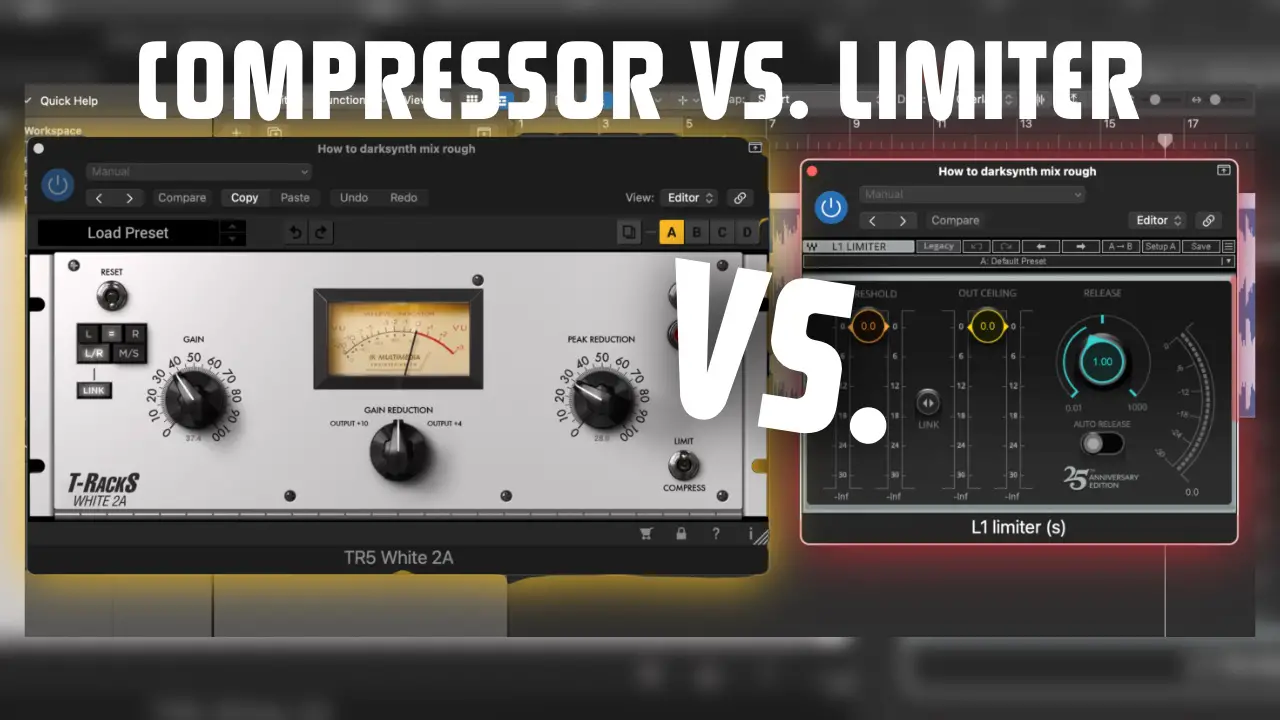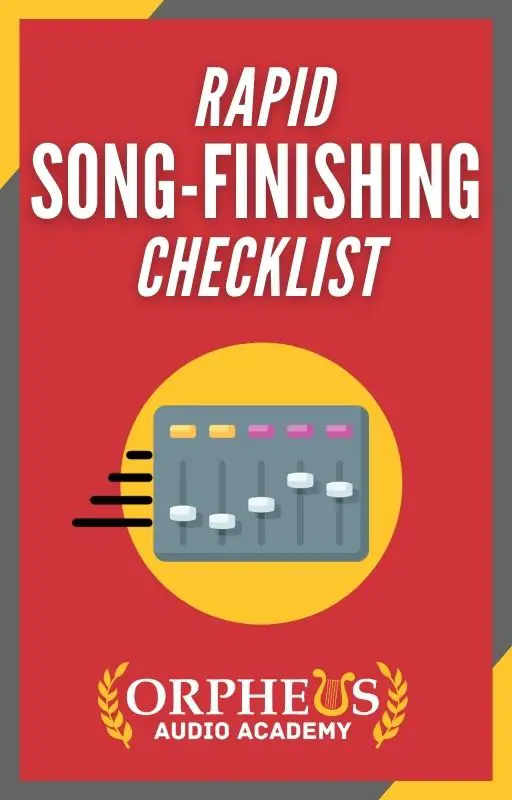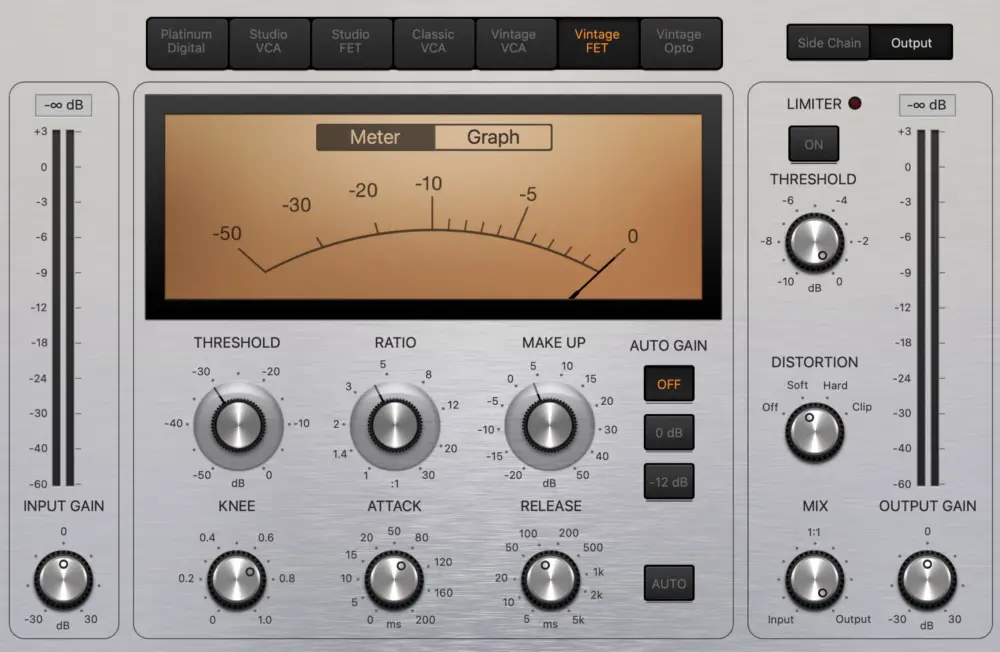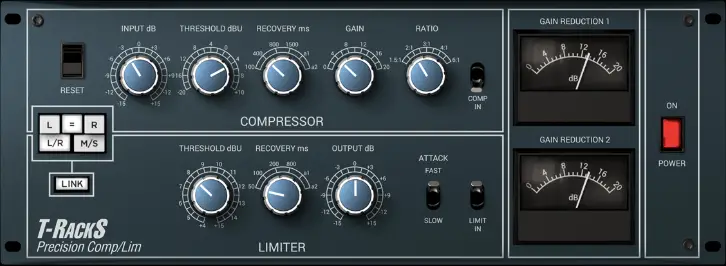It's no secret that compressor and limiting plugins are essential tools in any audio engineer's toolbox.
But what's the difference between a compressor and a limiter? When should you use each one?
A compressor is an amplifier who's output gain (dB) reduces as input gain (dB) increases (low volumes are raised as high volumes are reduced). A limiter, conversely, is an amplifier who's output gain (dB) has a volume limit that remains the same regardless of its input level (low volumes are raised while high volumes prevented from clipping).
In this article, we'll define compression and limiting, explain the differences between them, and give some tips on when to use each one.
Limiter Vs. Compressor: What's The Difference?

It's common to see compressor and limiter plugins used interchangeably, but there is a key difference between the two: compressors lower the volume of loud sounds, while limiters prevent sounds from getting too loud.
Compressors are typically used to even out the levels of a recording, so that the quietest parts are audible and the loudest parts don't clip or distort.
Limiters, on the other hand, are usually used in mastering to make sure that the audio doesn't exceed a certain level.
In other words, a limiter is basically a compressor with a super high compression ratio. Its main purpose is to turn down (limit) audio peaks.

Create Better Songs, Faster
Click below to download my free song-finishing checklist to help you create radio-ready songs without taking months to complete them.
Here's a quick overview of how each tool works:
While both compressors and limiters can be used to achieve similar results, it's important to know when to use each one.
In general, compressors are best for evening out the levels of a recording, while limiters are better for preventing audio from getting too loud.
When To Use A Compressor

Compressors are commonly used in a variety of situations, including:
- Recording: Compressors can be used to even out the levels of a recording, making sure that the quietest parts are audible and the loudest parts don't clip or distort.
- Mixing: Compressors can be used on individual tracks or groups of tracks to even out the levels and create a more polished sound.
- Mastering: Although limiters are typically used in mastering, compressors can also be used to gently reduce the dynamic range of a track before it is mastered.
When To Use A Limiter

Limiters are usually used in situations where it's important to prevent audio from exceeding a certain level, such as:
- Mastering: Limiters are used in mastering to make sure that the audio doesn't get too loud.
- "Peaky" instruments that sound fine, but can get too loud at parts and clip. Heavy hitting drums and vocals are good examples of this
- Live sound: Limiters can be used to prevent audio from clipping or distorting when it's played through a PA system.
- Broadcasting: Limiters are often used in radio and TV broadcasting to make sure that the audio doesn't exceed a certain level.
Should You Put A Limiter On Vocals?
It's common to see limiters used on vocal tracks, but there are a few things to keep in mind before using one.
First, remember that limiters can reduce the dynamic range of an audio signal, so it's important to use a gentle setting if you don't want to change the sound of the vocals too much.
Second, keep in mind that limiters can introduce artifacts such as pumping and breathing, so it's important to listen for these effects and adjust the settings accordingly.
Finally, remember that you can always add more compression later if you need it, but you can't un-limit a track once it's been limited and bounced.
Should You Mix With A Limiter?
In general, it's not a good idea to mix with a limiter.
The main purpose of a limiter on your mix bus is to bring up the volume of your mix.
However, the purpose of mixing is not to get a loud track, but to get a balanced track.
A limiter will reduce the dynamic range of your track, thus changing the sound of the song, and shaping your mixing decisions.
If you limit while you mix, you'll end up fighting the limiter, and you'll have a distorted view of the dynamics in your song. The end result is the "musicality" of your track can be lost.
You're better off just replying on EQ, compression, and other mixing techniques to create a well-balanced track, and then later, in the mastering phase, you add limiter to achieve commercial volume standards.
Conclusion: Limiter Vs. Compressor
Compressors and limiters are essential tools for any audio engineer. While they both reduce the dynamic range of an audio signal, compressors lower the volume of loud sounds, while limiters prevent sounds from getting too loud.
In general, compressors are best for evening out the levels of a recording, while limiters are better for preventing audio from getting too loud. Knowing when to use each one will help you get the best results for your project.
Do you have any questions about using compressors or limiters? Let us know in the comments below!
Finish More Radio-Worthy Songs, Faster!
If you want a proven step-by-step formula for mixing radio-worthy tracks from start-to-finish...
This checklist will walk you through a proven step-by-step mixing and mastering process so that you don't ever have to guess or wonder what to do next.
You'll know exactly what to do, and when, so you can quickly mix, master, and finish more tracks.
Next Steps
Check out my complete guide to compression here.
This article will break down how to use compression in your music like the pros.
I hope you found this post valuable on how to get vocals to sit upfront in the mix helpful.
If so, feel free to share, and let me know in the comments below…

